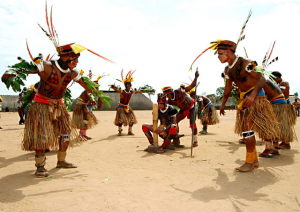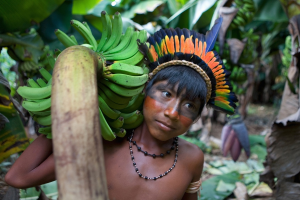(Boylove Documentary Sourcebook) - The Homoerotic Sex Play of the Prepubescent Boys of the Trumaí People of Central Brazil: Difference between revisions
Created page with "thumb|center|Xingu Indian Ceremony. Xingu Indigenous Park, Mato Grosso, [[Brazil. The ceremony of Tauarauanã (Tawarawana) is practiced by s..." |
Added two external links |
||
| (One intermediate revision by the same user not shown) | |||
| Line 26: | Line 26: | ||
[[File:Young Xingu boy of the Amazon rainforest with an armlet, beaded necklaces, face paint and a feathered headdress, holding a bunch of bananas.png|thumb|center|Young Xingu boy of the Amazon rainforest with an armlet, beaded necklaces, face paint and a feathered headdress, holding a bunch of bananas (2009). Xingu Indigenous Park, Mato Grosso, Brazil.]] | [[File:Young Xingu boy of the Amazon rainforest with an armlet, beaded necklaces, face paint and a feathered headdress, holding a bunch of bananas.png|thumb|center|Young Xingu boy of the Amazon rainforest with an armlet, beaded necklaces, face paint and a feathered headdress, holding a bunch of bananas (2009). Xingu Indigenous Park, Mato Grosso, Brazil.]] | ||
==External links== | |||
*[http://etnolinguistica.wdfiles.com/local--files/biblio%3Amurphy-1955-trumai/Murphy%26Quain_1955_trumai.pdf <i>The Trumaí Indians of Central Brazil</i> by Robert M. Murphy and Buell Quain (PDF)] | |||
*[https://greek-love.com/americas/the-trumai-of-brazil-1938 THE TRUMAÍ OF BRAZIL, 1938 (Greek Love Through the Ages)] | |||
[[Category:Boylove Documentary Sourcebook]] | [[Category:Boylove Documentary Sourcebook]] | ||
Latest revision as of 10:42, 1 December 2021

From The Trumaí Indians of Central Brazil by Robert M. Murphy and Buell Quain, Monographs of the American Ethnological Society (Locust Valley, New York; Glückstadt, Germany: J. J. Augustin Publisher, 1955). Footnote omitted.
The older boys occasionally accompanied the men on hunting and fishing trips, thus learning the necessary subsistence techniques. They participated actively in fish poisoning, helped in the preparation and application of the tawasi bark, and in the gathering of the drugged fish. Of all the subsistence techniques, horticulture was the last to be learned. The youngest Trumaí to have a garden was Autsuki, who was going through the final stages of the puberty ceremonies. Maibu’s foster son, Jawaku, was still considered too young to cultivate his own plot, although he was no more than two years younger than Autsuki. Most of the boys were well acquainted with the work, however, through trailing the men to the gardens and watching them.
Among the eight boys below the ages of Autsuki and Jawaku there were no clearly organized groups. When outdoors they usually played in small groups of three or four, although nearly all would gather together occasionally for some special activity. The small groups were usually composed of age mates. Tsirikoan, the youngest, spent most of his time in the house, while the oldest boy, Muruta, was already drifting away from the others and spending more time with the men. Tay, an orphan boy of between ten and twelve years of age, was decidedly a misfit and did not join the others often. Of the remaining five, the three oldest were steady companions, while the two youngest either trailed them or stayed near their houses.
Despite the fact that the children were together frequently, there were no fast friendships or strong ties of loyalty and dependence. In this respect they were much like the men. Their play together was sporadic, and participation was fluid and shifting.
The only organized play in which the children indulged was wrestling. Matches were infrequent and usually broke up within fifteen minutes. All the boys turned out on such occasions except Tay, whose interests were abnormally directed toward homosexual play. The wrestling matches were a complete replica of the adult contests, the boys even sitting on the log in the men’s circle (this was one of the few times they were permitted to do so). The adults never interfered. Usually they stood near the houses and watched the grappling with great amusement.
[...]
Nor was the sex play of children greatly inhibited by their elders. Actually there was no heterosexual activity between children, for there were no girls of appropriate age in the village. Thus, pre-pubescent sexual relations occurred between boys or between boys and men, and almost always it was the boys who were the instigators. Quain felt certain that Tay was the only member of the village who might be considered a homosexual. He was an orphan, and although he was fed and housed, he was identified with no family, and no one took any special interest in him. Tay, more than any boy, remained aloof from other children. His sexual advances were directed to a large extent toward the older males, who often cooperated with him. For example, he often wrapped his legs around Jakuma’s hips, going through sexual motions. The older man would giggle when he did this and show signs of being mildly stimulated. Mayuva, among others, was less receptive, but his only mode of resistance was to arch his body away from the boy.
The sexual play of a young child might even include his father. Quain observed little Tsirikoan tugging at his father’s penis. The father showed some annoyance, but only because he did not want to be bothered. Although children were rarely manipulated in this way by the men, Quain saw Yanahi, a young married man, amusing himself and some boys by pulling Tsirikoan’s penis until the child had an erection. The boys whispered to Yanahi that Quain was watching, but this apparently made no difference to him, for he continued his activity.
The minor homosexual engagements that took place between the boys themselves were likewise in the nature of play. Quain saw no homosexuality between adults, and, contrary to Levi-Strauss’ inference from Quain’s notes, there was no kinship tie that implied permissible homosexual relations.
The facts of sex were certainly no secret to the children. Living in undivided houses and sleeping with or adjacent to their parents, they were aware at an early age of the sexual activities of their elders. No effort was made to keep sexual knowledge from them, and they derived considerable amusement from the sexual affairs of the adults. Tsirikoan and some other boys raised a great hue and cry when they happened upon his parents cohabiting; and they immediately told everyone in the village.
